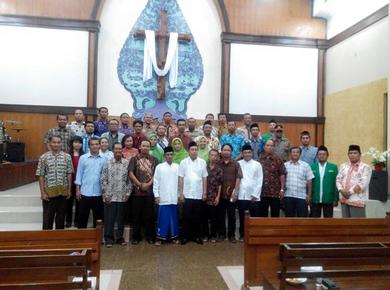Posted: November 15, 2017
A renewed peace church calls for renewed commitment to one another; even those who may be our enemies. Building bridges resolves disconnectedness. Without relationship and connectedness peace cannot flourish. This is essential if we want to relate with those who are of a different faith or culture.
A significant challenge in multi-faith and cross-cultural relationships is the perception we create of the other based on assumptions and preconceptions. This causes us not to see and value the other as a child of God. To overcome this challenge, it is important to meet.
Hospitality plays a key role in building understanding across religious and cultural views. Churches have a responsibility to create spaces where authentic engagement can occur. However, churches must also embody the spirituality of a stranger, a guest, assuming a position of vulnerability. This provides the disposition to reach out. The church no longer has to wait to host others, but can initiates new forms of relationships with others.
The Javanese Mennonite Church in Jepara does this is by visiting our Muslim neighbours. Mennonites in Jepara comprise about 1% of the total population, which is largely Muslim. There is no animosity between the different religions in Jepara, but even though our church building is only 300 meters away from an Islamic organization’s building, there has not been much of a relationship established among Christians and Muslims!
When our church decided to take seriously our call to be a peace church, we prioritized building relationships with those of other religions in our city. Our first step was to visit one of the young Islamic leaders and share our dream to build relationships between Mennonites and Muslims in Jepara. Together we arranged an art and culture performance in which our communities, not just our leaders, could participate and get to know each other. We also initiated meetings to reduce wrong perceptions of the other.
This required a long process. It was difficult to look beyond our suspicion (or preconceived notions) of the other. After seven years, we have a good relationship with our Muslim neighbours. We celebrate the International Day of Peace together; the church participates in their anniversary celebrations; they participate in our Christmas celebrations, even when there is a fatwa that prevents Muslims from giving Christmas greetings to Christians in Indonesia.
Assuming the posture of a visitor requires humility. We approach others without having a full picture of who they are. This requires us to approach someone with respect and trust, believing that we have something to learn from those who may be different. The vulnerability that comes with being a visitor or stranger requires one to need the other. It means that we come not in arrogance and power but with openness and sincerity, vulnerable with the possibility of being rejected.
Such an approach does, however, bring hope. In being a vulnerable guest, we invite prayer and blessing from the other, even if the other is our enemy. This is the posture that Jesus demonstrates through his incarnation. The reconciliation Jesus provides between humanity with God is made possible through his example of being a guest in the world. He emptied himself and became a servant, thus showing humility. He embraced suffering, which demonstrated his vulnerability (Philippians 2:6–8). His posture provided the means for God’s peace to be realized (Ephesians 2:14), which provides us with hope and courage.
–A Mennonite World Conference release by Danang Kristiawan (Indonesia)
This testimony is part of the Peace Sunday worship resource for 2017. Click here to see more: www.mwc-cmm.org/peacesunday



Comments: